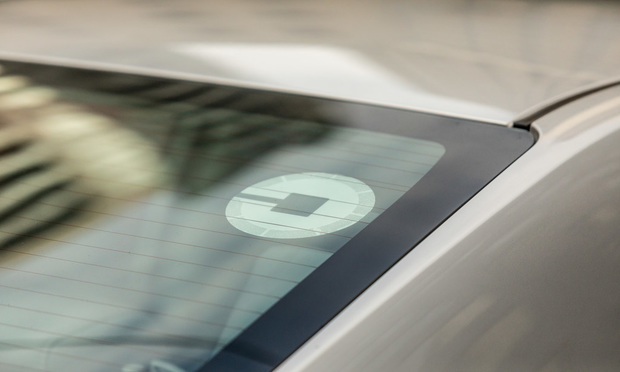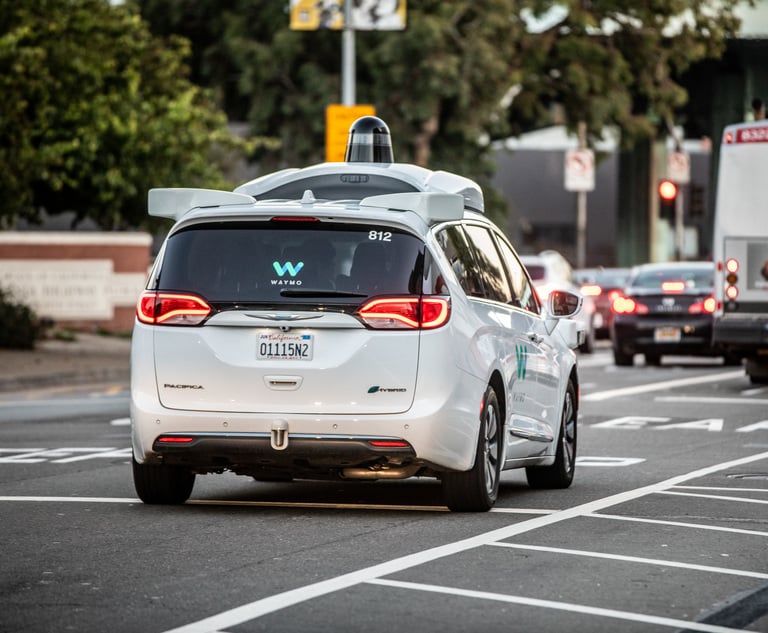Uber Can't Completely Shake Jane Doe Assault Case
Uber dodged two negligence claims for failing to control the circulation of its identifying decals in a lawsuit where the signage was used to lure a sexual assault victim. The Jane Doe rape survivor's putative damages claim, however, lives on.
November 22, 2019 at 06:11 PM
5 minute read
 Uber car
Uber car
Uber Technologies Inc. dodged negligence claims for failing to take steps to prevent its identifying decals from being used to lure a sexual assault victim after a federal judge dismissed two of three causes of action Friday in a case brought by a Jane Doe rape survivor.
U.S. Magistrate Judge Jacqueline Scott Corley of the Northern District of California threw out the June complaint's claim that Doe's assault, battery and false imprisonment occurred as a result of her belief that the driver was employed by Uber, or acted as an "ostensible agent" of the company. The man, who had been booted off the platform for misconduct, used a decal to pose as Doe's safe ride. The judge also tossed out claims that, as a transporter of people and goods, Uber had a higher standard of care under the common carrier doctrine.
"While plaintiff has plausibly alleged ostensible agency, she has not plausibly alleged that the assailant was acting within the scope of his ostensible agency when he assaulted plaintiff," Corley wrote. "Nor has she plausibly alleged that she had a common carrier/passenger relationship with Uber in connection with the assault."
The driver's decision to attack the woman was unrelated to his duties as a driver, as his " aberrant decision" to rape Doe was not inherent in the working environment or typical of the business, according to the opinion.
"Even if the assailant was an actual Uber employee as opposed to an ostensible agent, and drawing all reasonable inferences in plaintiff's favor, the complaint does not plausibly allege that the sexual assault arose from the assailant's job to drive plaintiff to her chosen destination," Corley wrote.
Matthew Davis, an attorney with Walkup, Melodia, Kelly & Echeverria in San Francisco who represents Doe, told The Recorder this summer that Uber has "effectively changed the public's attitude to feel like it's safe to get into a strangers car if they have a decal on the window, and they almost alone are responsible for that shift in attitude."
The plaintiff lives in Mexico and was visiting her fiance in San Mateo County at the time of the August 2018 assault. Since her phone was dying, she asked her fiance to request an Uber to pick her up from the mall. As a non-native English speaker, she approached a car with an Uber decal after she thought she heard the driver say her fiance's name, according to the complaint. When Doe got into the car, the driver turned on the child-safety locks, drove to a remote location, and raped and choked her.
San Mateo police later arrested the driver, who was was kicked off the app a few months before the assault for taking a passenger off-route to a horse barn "to talk," according to the complaint.
Corley rejected the plaintiff's arguments that Uber's safety assurances and marketing puts the driver's actions within the scope of employment, a necessary prong in proving liability through ostensible agency.
"While the court accepts as true that passengers expect Uber to perform background checks on its drivers to mitigate the risk of assault, including sexual assault, the same expectation is no doubt true, if not truer, for hospital employees left alone with patients in physically vulnerable positions," she said. "Further, that Uber encouraged passengers to feel safe in an Uber as part of its disruption of the taxi industry is just another way of saying that Uber passengers are in a vulnerable position."
Uber could not be classified as a common carrier, a designation for entities responsible for transporting people and good and subject to a higher standard of care, because the common carrier relationship does not apply to passengers who have yet to board the vehicle under California law.
"Plaintiff was not in Uber's exclusive control; she was free to go wherever she wanted or to not even attempt to board the Uber vehicle when it arrived," according to the order. "And, as it tragically turned out, she never entered an authorized Uber vehicle."
Doe's punitive damages claim, however, remains intact, and she has 30 days to amend the complaint on the other two claims.
"Intentional failure to retrieve the decal could rise to a level of 'extreme indifference' necessary to support an award of punitive damages," Corley wrote. "Uber has not shown that plaintiff's punitive damages claim fails as a matter of law."
Davis said the plaintiffs' team plans to amend the complaint with a straight negligence claim against the company. With Corley's ruling that sexual assault does not fall under the scope of employment in ostensible agency, now there's a split within the district, he said.
Her decision departs from a 2016 Doe case against Uber overseen by U.S. District Judge Susan Illston of the Northern District of California. In that case, Illston ruled that "the court cannot determine—as Uber effectively argues—that as a matter of law sexual assault by Uber drivers is always outside the scope of employment, if the drivers are in fact ultimately found to be employees."
Although Davis said he is disappointed with the decision, he suspects this will not be the last word on scope of employment in this context.
"At some point, the Ninth Circuit might have to make a decision on that," he said.
Uber and its counsel, Steven Rob Disharoon of Wood Smith Henning and Berman in Concord, California, did not respond to a request for comment at the time of publication.
In recent months, a slew of suits against Uber and Lyft hit California courts. As of September, Levin Simes Abrams in San Francisco was investigating about 120 claims of assault and harassment from ridesharing drivers.
This content has been archived. It is available through our partners, LexisNexis® and Bloomberg Law.
To view this content, please continue to their sites.
Not a Lexis Subscriber?
Subscribe Now
Not a Bloomberg Law Subscriber?
Subscribe Now
NOT FOR REPRINT
© 2025 ALM Global, LLC, All Rights Reserved. Request academic re-use from www.copyright.com. All other uses, submit a request to [email protected]. For more information visit Asset & Logo Licensing.
You Might Like
View All
Shareholder Democracy? The Chatter Musk’s Tesla Pay Case Is Spurring Between Lawyers and Clients
6 minute read
Willkie Farr & Gallagher Drives Legal Challenge for Uber Against State's Rideshare Laws
5 minute read

EPA grants California authority to ban sales of new gas cars by 2035. Action faces reversal by Trump
Law Firms Mentioned
Trending Stories
- 1Bar Report - Jan. 20
- 2Saxton & Stump Lands Newly Retired Ex-Chief Judge From Middle District of Pa.
- 3Judicial Admissions and Medical Malpractice Defense
- 4South Florida Attorney Charged With Aggravated Battery After Incident in Prime Rib Line
- 5'A Death Sentence for TikTok'?: Litigators and Experts Weigh Impact of Potential Ban on Creators and Data Privacy
Who Got The Work
J. Brugh Lower of Gibbons has entered an appearance for industrial equipment supplier Devco Corporation in a pending trademark infringement lawsuit. The suit, accusing the defendant of selling knock-off Graco products, was filed Dec. 18 in New Jersey District Court by Rivkin Radler on behalf of Graco Inc. and Graco Minnesota. The case, assigned to U.S. District Judge Zahid N. Quraishi, is 3:24-cv-11294, Graco Inc. et al v. Devco Corporation.
Who Got The Work
Rebecca Maller-Stein and Kent A. Yalowitz of Arnold & Porter Kaye Scholer have entered their appearances for Hanaco Venture Capital and its executives, Lior Prosor and David Frankel, in a pending securities lawsuit. The action, filed on Dec. 24 in New York Southern District Court by Zell, Aron & Co. on behalf of Goldeneye Advisors, accuses the defendants of negligently and fraudulently managing the plaintiff's $1 million investment. The case, assigned to U.S. District Judge Vernon S. Broderick, is 1:24-cv-09918, Goldeneye Advisors, LLC v. Hanaco Venture Capital, Ltd. et al.
Who Got The Work
Attorneys from A&O Shearman has stepped in as defense counsel for Toronto-Dominion Bank and other defendants in a pending securities class action. The suit, filed Dec. 11 in New York Southern District Court by Bleichmar Fonti & Auld, accuses the defendants of concealing the bank's 'pervasive' deficiencies in regards to its compliance with the Bank Secrecy Act and the quality of its anti-money laundering controls. The case, assigned to U.S. District Judge Arun Subramanian, is 1:24-cv-09445, Gonzalez v. The Toronto-Dominion Bank et al.
Who Got The Work
Crown Castle International, a Pennsylvania company providing shared communications infrastructure, has turned to Luke D. Wolf of Gordon Rees Scully Mansukhani to fend off a pending breach-of-contract lawsuit. The court action, filed Nov. 25 in Michigan Eastern District Court by Hooper Hathaway PC on behalf of The Town Residences LLC, accuses Crown Castle of failing to transfer approximately $30,000 in utility payments from T-Mobile in breach of a roof-top lease and assignment agreement. The case, assigned to U.S. District Judge Susan K. Declercq, is 2:24-cv-13131, The Town Residences LLC v. T-Mobile US, Inc. et al.
Who Got The Work
Wilfred P. Coronato and Daniel M. Schwartz of McCarter & English have stepped in as defense counsel to Electrolux Home Products Inc. in a pending product liability lawsuit. The court action, filed Nov. 26 in New York Eastern District Court by Poulos Lopiccolo PC and Nagel Rice LLP on behalf of David Stern, alleges that the defendant's refrigerators’ drawers and shelving repeatedly break and fall apart within months after purchase. The case, assigned to U.S. District Judge Joan M. Azrack, is 2:24-cv-08204, Stern v. Electrolux Home Products, Inc.
Featured Firms
Law Offices of Gary Martin Hays & Associates, P.C.
(470) 294-1674
Law Offices of Mark E. Salomone
(857) 444-6468
Smith & Hassler
(713) 739-1250






